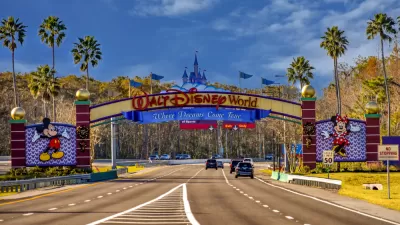The city of Woodland, Washington, offers a case study in government funding. Voters there will consider a sales tax as part of its transportation benefit district, but the benefit could extend to the police department as well.
"When Woodland residents vote in November, they’ll have the opportunity to approve a 0.2 percent sales tax for transportation projects, reports Adam Littman.
"The tax, to be applied on top of the city’s existing 7.8 percent rate, comes from the transportation benefit district that formed in June," adds Littman. The state law's allowance of transportation benefit districts means Woodland's action could follow in the footsteps of previous benefit districts like those in Battle Ground and Vancouver, both located in Clark County.
The aim of the new tax, however, is far from the transit taxes that attract media attention in large cities around the country. Littman explains:
A major reason for the transportation benefit district was to fund roadwork and free up money for the Woodland Police Department. [Mayor Will] Finn said money is now diverted to roadwork from the city’s general fund, but if the city can find some other revenue source for transportation, more money can go to the police department.
So while the police department would have more money for hiring, the transportation benefit district would continue funding projects like "sidewalk and curb replacement or repairs, chip seal and pavement maintenance/repair, pavement overlays, [the] Scott Avenue reconnection and the city’s six-year capital projects plan."
FULL STORY: Woodland’s fledging transportation benefit district awaits vote on sales tax

Planetizen Federal Action Tracker
A weekly monitor of how Trump’s orders and actions are impacting planners and planning in America.

Map: Where Senate Republicans Want to Sell Your Public Lands
For public land advocates, the Senate Republicans’ proposal to sell millions of acres of public land in the West is “the biggest fight of their careers.”

Restaurant Patios Were a Pandemic Win — Why Were They so Hard to Keep?
Social distancing requirements and changes in travel patterns prompted cities to pilot new uses for street and sidewalk space. Then it got complicated.

Platform Pilsner: Vancouver Transit Agency Releases... a Beer?
TransLink will receive a portion of every sale of the four-pack.

Toronto Weighs Cheaper Transit, Parking Hikes for Major Events
Special event rates would take effect during large festivals, sports games and concerts to ‘discourage driving, manage congestion and free up space for transit.”

Berlin to Consider Car-Free Zone Larger Than Manhattan
The area bound by the 22-mile Ringbahn would still allow 12 uses of a private automobile per year per person, and several other exemptions.
Urban Design for Planners 1: Software Tools
This six-course series explores essential urban design concepts using open source software and equips planners with the tools they need to participate fully in the urban design process.
Planning for Universal Design
Learn the tools for implementing Universal Design in planning regulations.
Heyer Gruel & Associates PA
JM Goldson LLC
Custer County Colorado
City of Camden Redevelopment Agency
City of Astoria
Transportation Research & Education Center (TREC) at Portland State University
Camden Redevelopment Agency
City of Claremont
Municipality of Princeton (NJ)





























